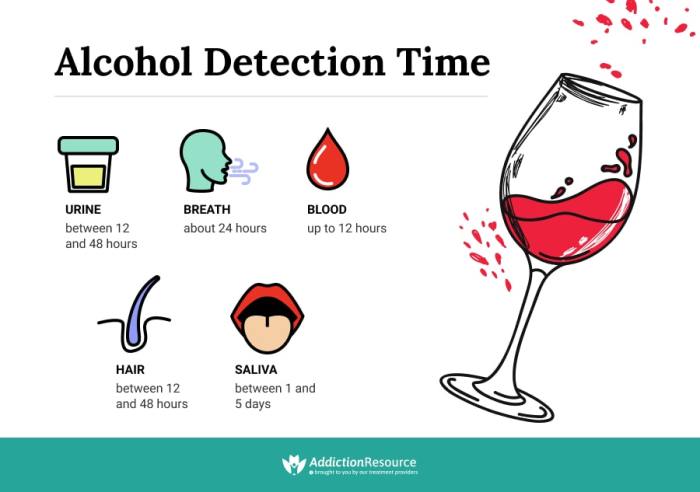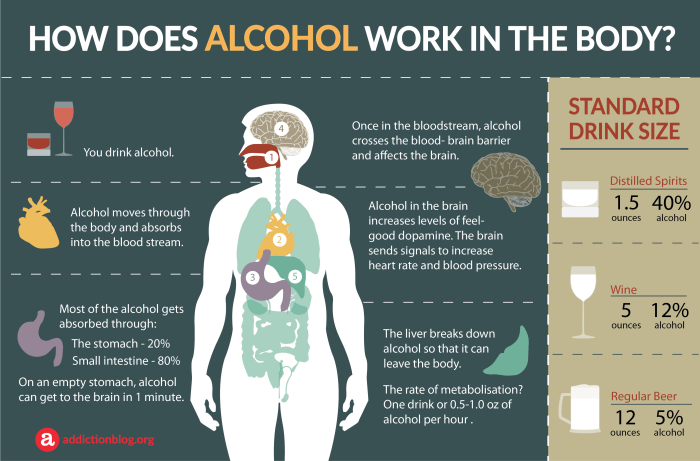Embarking on the process of learning to live an alcohol-free life is a transformative journey that unveils a path toward physical, psychological, and social well-being. This odyssey demands courage, resilience, and a deep-seated desire for self-discovery and personal growth.
Alcohol’s pervasive influence on our society often obscures its detrimental effects on our bodies, minds, and relationships. Understanding these consequences is paramount in comprehending the profound benefits of choosing an alcohol-free existence.
The Physical Impact of Alcohol on the Body

Alcohol consumption has significant physical effects on the body. When ingested, alcohol is absorbed into the bloodstream and distributed throughout the body, where it can impact various organs and systems.
One of the primary targets of alcohol is the brain. Alcohol acts as a depressant, slowing down brain activity and impairing cognitive function. This can lead to impaired judgment, slowed reaction times, and memory loss.
Alcohol also affects the liver, which is responsible for metabolizing alcohol. Excessive alcohol consumption can damage the liver, leading to conditions such as fatty liver, cirrhosis, and liver failure.
Other organs affected by alcohol include the heart, pancreas, and kidneys. Alcohol can increase blood pressure, heart rate, and the risk of heart disease. It can also damage the pancreas, leading to pancreatitis, and the kidneys, causing kidney damage and failure.
Additionally, alcohol is a major contributing factor to addiction. Regular alcohol consumption can lead to physical dependence, where the body adapts to the presence of alcohol and experiences withdrawal symptoms when it is removed.
The Psychological Impact of Alcohol

Alcohol consumption also has a significant impact on mental health. In the short term, alcohol can produce feelings of euphoria, relaxation, and disinhibition.
However, prolonged alcohol use can contribute to a range of mental health issues, including anxiety, depression, and other mood disorders. Alcohol can also exacerbate existing mental health conditions.
Furthermore, alcohol can impair judgment and decision-making, leading to risky behaviors and poor choices.
The Social Impact of Alcohol: The Process Of Learning To Live An Alcohol-free Life Is
Alcohol plays a complex role in social situations. It can be used as a social lubricant, facilitating interactions and reducing inhibitions.
However, excessive alcohol consumption can also lead to conflict, violence, and other social problems. Alcohol-related incidents can damage relationships, disrupt family life, and affect work performance.
Moreover, alcohol consumption can contribute to social isolation and stigma, particularly for individuals with alcohol use disorders.
The Process of Recovery from Alcoholism
Recovery from alcoholism is a complex and challenging process that involves multiple stages.
The first stage, detoxification, involves the body’s elimination of alcohol. This process can be physically and psychologically difficult and may require medical supervision.
Once detoxified, individuals enter treatment, which may include therapy, support groups, and medication. Treatment aims to address the underlying causes of alcohol addiction and develop coping mechanisms.
After completing treatment, individuals enter ongoing recovery, which involves maintaining sobriety and managing the challenges of life without alcohol.
Recovery from alcoholism is an ongoing process that requires commitment, support, and self-care.
Strategies for Living an Alcohol-Free Life

Maintaining sobriety requires developing and implementing effective strategies.
One important strategy is avoiding triggers, or situations or substances that can lead to alcohol cravings.
Building a support system is also crucial. This can include friends, family members, support groups, or a therapist.
Engaging in healthy activities, such as exercise, hobbies, or spending time in nature, can provide alternative sources of enjoyment and fulfillment.
Self-care, including mindfulness and goal-setting, is also important for maintaining recovery.
The Benefits of Living an Alcohol-Free Life
Living an alcohol-free life offers numerous benefits.
Physically, abstaining from alcohol can improve liver function, heart health, and overall well-being.
Psychologically, it can reduce anxiety, depression, and other mental health issues.
Socially, it can improve relationships, family life, and work performance.
Overall, living an alcohol-free life can significantly enhance quality of life and well-being.
Resources for Alcohol Recovery
Individuals seeking help with alcohol addiction have access to a range of resources.
Support groups, such as Alcoholics Anonymous (AA) and SMART Recovery, provide a supportive environment for individuals in recovery.
Treatment centers offer comprehensive programs that include detoxification, therapy, and support.
Online resources, including websites and mobile apps, provide information, support, and access to recovery services.
Professional help from therapists, counselors, or physicians is also essential for successful recovery.
Expert Answers
What are the physical benefits of quitting alcohol?
Quitting alcohol can improve liver function, reduce inflammation, lower blood pressure, and enhance sleep quality.
How does alcohol impact mental health?
Alcohol can exacerbate anxiety, depression, and other mental health issues by disrupting brain chemistry and neurotransmitter balance.
What is the first step in recovering from alcoholism?
The first step in recovering from alcoholism is recognizing the problem and seeking professional help.